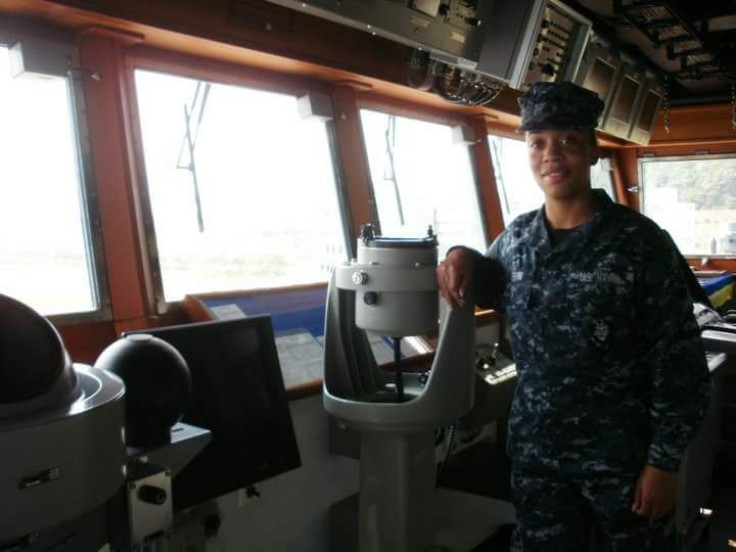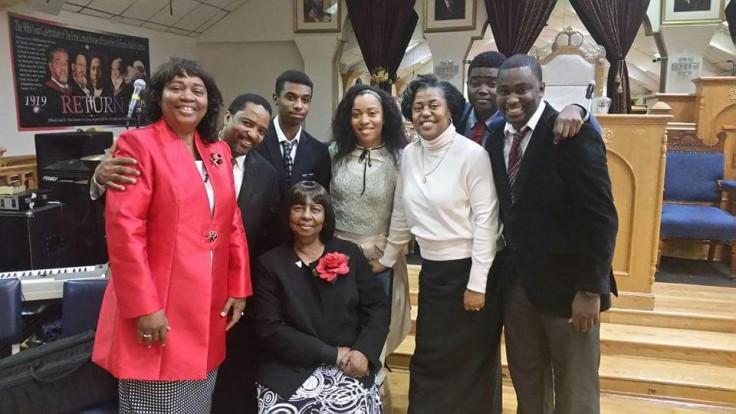What Happened To Janaye Ervin: Navy Punished, Threatened And More, Ex-Sailor Says In Exclusive Interview
Former Navy intelligence specialist Janaye Ervin still refuses to stand for the “Star Spangled Banner.”
“To be honest, I never really thought about the flag my entire life,” she told International Business Times. “I had no reason to: It’s just a flag,” she said, “and the national anthem — I don’t think I’ll be saluting it or standing for it ever again.”
Ervin was the sailor who, on reserve duty in September, refused to stand for the national anthem during “morning colors” at the Joint Base Pearl Harbor-Hickham in Hawaii. She shared her protest on Facebook – a post that has since been deleted – saying she couldn’t stand for the anthem, given the treatment of African-Americans around the country. The Navy responded by threatening her with jail time, she said in the post, and the removal of her security clearance.
For the first time since the protest, Ervin gave her account of the incident and the subsequent fallout. In exclusive interviews with IBT this week, she also explained what inspired the protest.
"Petty Officer Janaye Ervin has fulfilled her obligation of enlistment and was honorably discharged from the United States Navy," a Navy Reserve Forces spokesperson said in response to an IBT request for comment.
A Navy brat whose grandfather, father and brother also served, Ervin never expected to be at odds with the brass. But her September protest made headlines across the country, apparently even drawing attention from Colin Kaepernick, the NFL quarterback whose anthem protest drew both followers and harsh critics.
Ervin accuses the Navy of threatening her career, removing her from her regular post as an intelligence specialist, revoking her security clearance and assigning her to wash and wax cars as a punishment.
She was fired from her job at Leidos, a government contractor, after someone from the Navy called her employer to say her clearance was suspended, she said. Ervin told IBT the company’s human resources department told her they didn’t have work for her without a security clearance.

The incident began Sept. 19 on Ford Island, located in the heart of Pearl Harbor, when Ervin was preparing for work on the base. She was checking the latest news and saw a report on the death of Terence Crutcher, a 40-year-old black man who was shot and killed by a local police officer on a road in Tulsa, Oklahoma.
“That was the last story I saw before the song started playing, and I was really sad and I just didn’t want to stand at that moment,” Ervin said. She thought, “I can’t stand for this song knowing that the song isn’t for me, being black. The song doesn’t represent me at all.”
Still, there was a moment of hesitation.
“I decided not to sit, I was going to stand. But I changed my mind mid-standing and sat back down.”
While the anthem was playing and Ervin remained seated, a civilian — a man she’d never met — walked up and asked why she wasn’t standing while in uniform. Ervin said she didn’t have to.
“We’ll see about that,” she says he replied.
A few hours later, while working her regular post at SCIF (the Sensitive Compartmented Information Facility, where classified information is kept), Ervin said she was approached by a superior who asked about the protest. Ervin confirmed that she hadn’t stood.
“You do not get to make that choice,” the unnamed superior yelled at her, according to Ervin. “You don’t have rights anymore. You signed away your rights.”
Ervin was called in for a meeting the next morning with several superior officers. She was read her rights.
“‘You don’t want this to mess up your future,’” Ervin said she was told.
The questioners coaxed out of her that she was an SSO, a Special Security Officer. That allowed Navy brass to figure out that she needed a security clearance for her civilian job, Ervin told IBT. It was the only thing she told them, she says.
The following day, an officer told Ervin her security clearance was being taken away and that she needed to hand over her access badges. She was escorted out of the SCIF.
Ervin says she was sent to the Executive Transportation Office — a VIP parking center for the base — and told to wash and wax cars, pull weeds, clean the locker room and perform other menial tasks.
“They’re pretty much making me do manual labor as punishment, even though they don’t even know what happened because I haven’t said anything yet, but I guess they’re just going off what that civilian told them,” Ervin said.

Ervin said no one told her directly she was in trouble for not standing for the anthem — just that she could be facing a charge under Article 92 of the Uniform Code of Military Justice for failing to obey a direct order. She says she wasn’t told what order she failed to follow.
“So, well, I’m getting punished without even going to trial or anything, or going through any due process,” Ervin said. “Okay, I guess we just go straight to punishment. But it’s not that bad — it’s just extra duty, it’s like visiting your grandma. You visit grandma and you have to pull some weeds and clean things.”
Still, Ervin feared further punishment. She said that’s when she emailed New York Daily News reporter and activist Shaun King.
King offered encouragement and, she said, urged her to post her experience on social media.
“What do you need? Colin Kaepernick asked me to ask you as well,” read one of King’s emails, which were shown to IBT.
(In response to IBT questions, King declined to discuss his communications with Ervin.)
Ervin left the base as scheduled on Sept. 23; at home, she found an email from her supervisor at Leidos, telling her not to show up for work on Sept. 26.
Ervin’s supervisor told her someone from the Navy had called him to say that Ervin’s security clearance had been “suspended” — a surprise to Ervin, who had been told her clearance was gone.
In response to a request for comment, a spokesperson for Leidos said the company had “nothing” to say at this time.
Leidos continued to pay Ervin through her original end of service date. She’s now collecting unemployment and looking for a new job.
The Navy is not pursuing charges. And Ervin, though she is no longer in the service, still considers herself a proud American.
“I was always a patriot, That’s why I feel so strongly about including all Americans in the national anthem, and not treating certain Americans differently,” Ervin said. “The Constitution is supposed to be applied to all Americans, not just some of us.
“So I’m very much a patriot, otherwise I wouldn’t have cared. I just would’ve gotten a paycheck, and gone home, and not said anything.”
© Copyright IBTimes 2024. All rights reserved.











